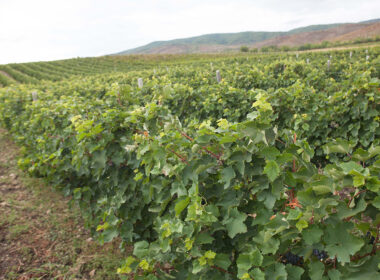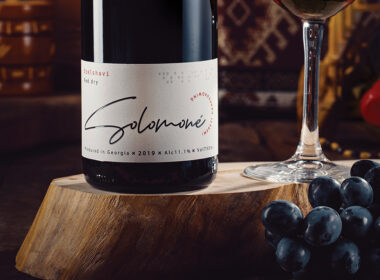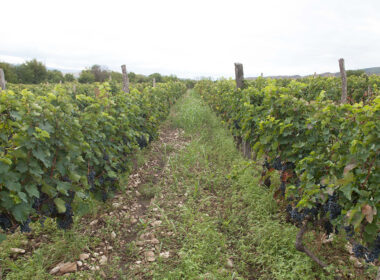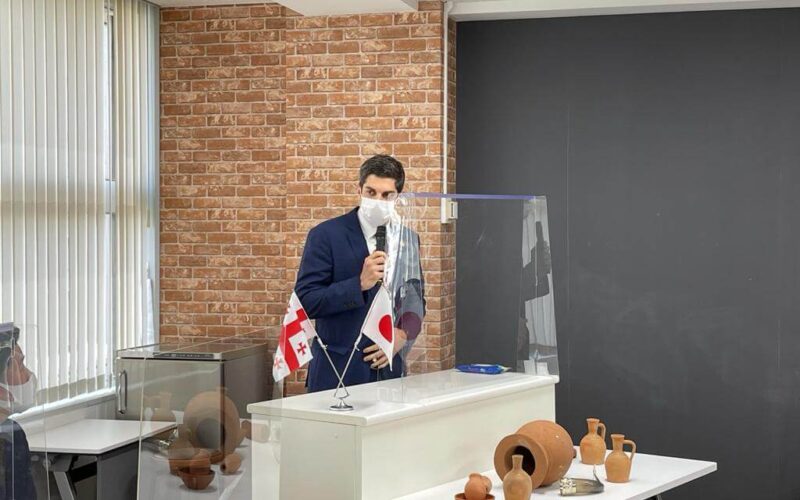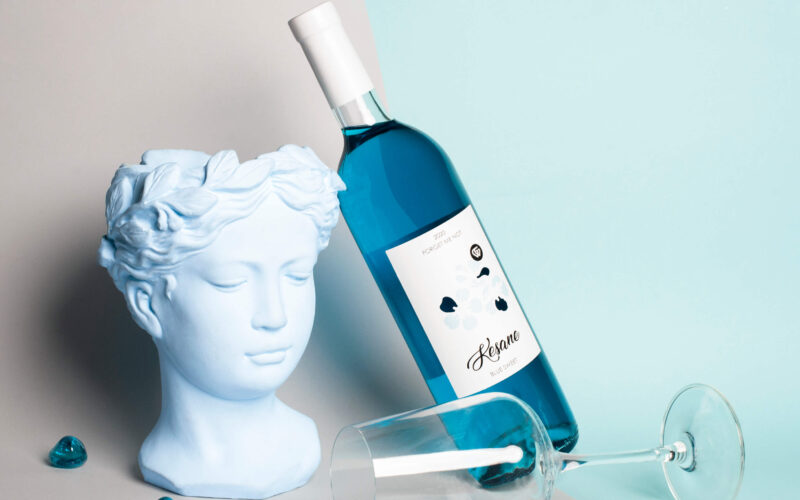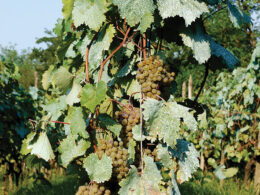The Embassy of Georgia in Japan as well as it’s the Ambassador, Mr. Teimuraz Lezhava, are actively involved in promoting Georgian culture, wine, and cuisine. As a result of their efforts, many people in Japan are already familiar with Georgian culture. Georgian wine stores and restaurants opening in the country offer the Japanese people the opportunity to taste our traditional dishes and wine.
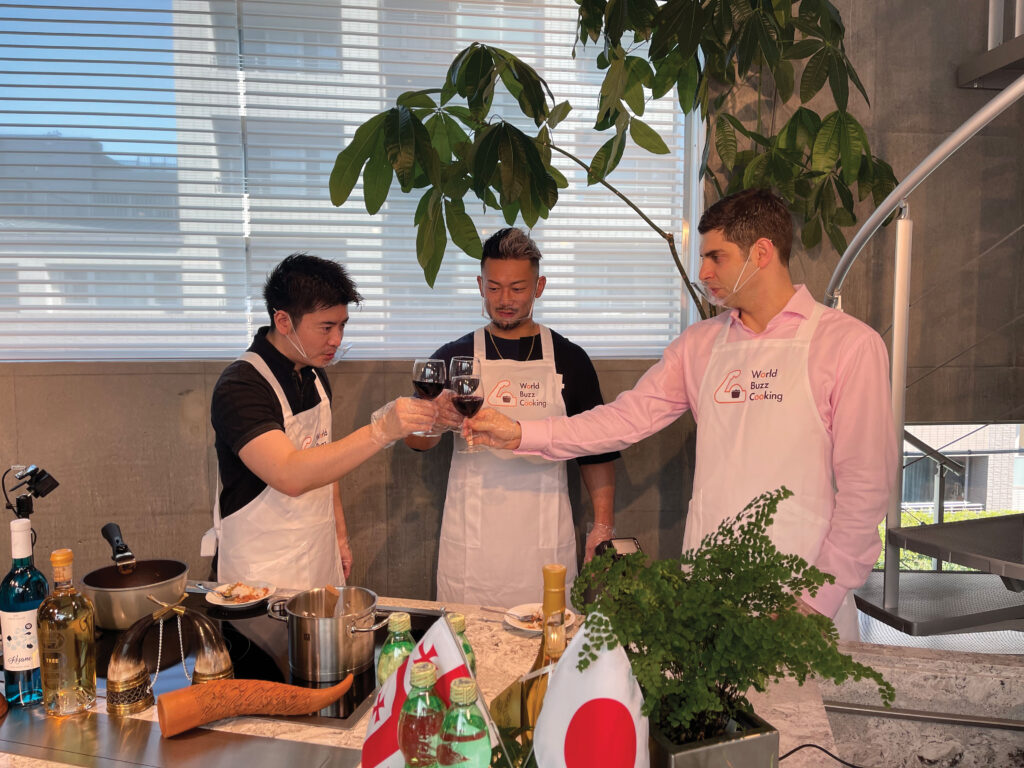
Japan is a strategic market for Georgian wine. With the support of the National Wine Agency, Georgian wine was first presented in the country in 2014. Over the next few years, Georgian wine producers participated in Foodex Japan and Wine and Gourmet Japan. These two exhibitions were followed by various wine competitions, wine tours by Japanese wine professionals and media representatives in Georgia, presentations, and tastings of Georgian wine in different Japanese cities. These activities have largely contributed to rising export numbers.
The Japanese are always open to novelty, including novelty in wine. Today, many first-rate Japanese restaurants carry a selection of Georgian wines. Qvevri wines are especially popular. As the Master of Wine, Kenichi Ohashi, mentioned in one of our conversations: “Georgian qvevri wines are absolutely unique and have a beautiful history, which is so admired by the Japanese. It pairs very well with Japanese dishes.”
Teimuraz Lezhava, Georgian Ambassador to Japan said, “The awareness of Georgian wine and cuisine have especially increased after Tochinoshin’s victory. The essential activities that our embassy carried out, and continues to execute to this day, have further contributed to this increase. Georgian cuisine is rather popular here, especially our Shkmeruli dish. Our embassy’s media strategy additionally boosted the popularity of Georgian cuisine. Besides our activities on social media, I gave interviews to 5 to 10 media outlets in a month. I used this opportunity to inform the Japanese people about Georgian qvevri wine and its 8000-year-old tradition that we still cherish to this day.”
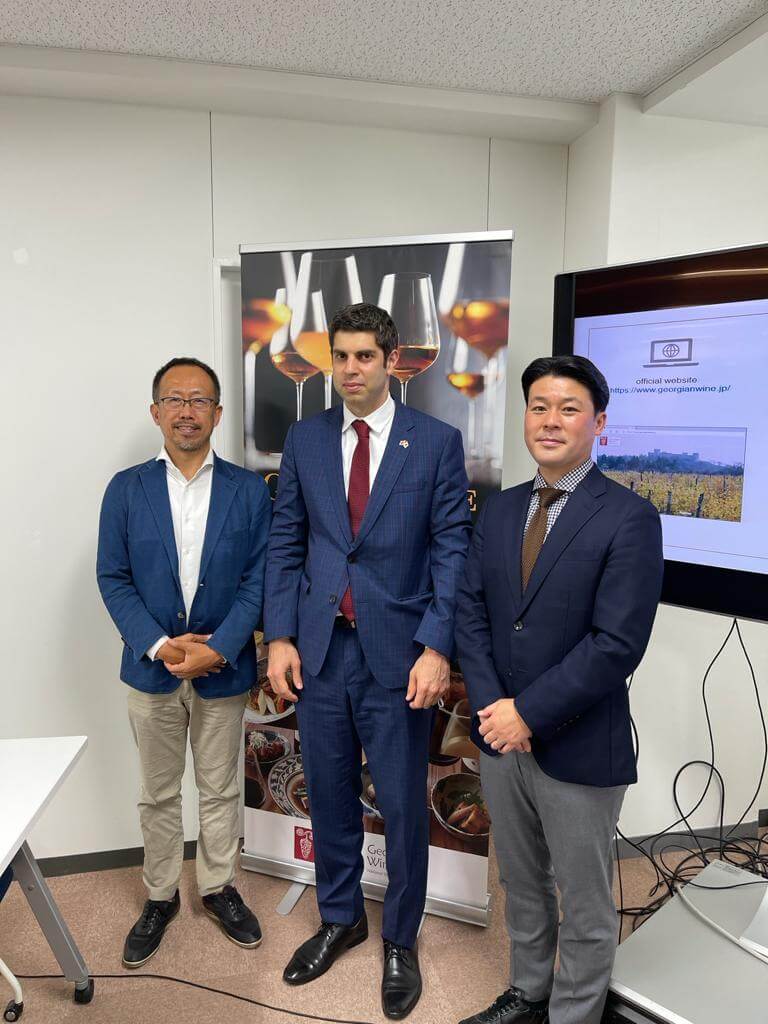
Being the homeland of wine gives Georgia the greatest advantage and our wine the greatest potential. Knowing that this wine comes from the birthplace of wine, how can you pass up the opportunity to taste it at least once?
Q: In addition, the traditional wine-making method is included in UNESCO’s list of intangible heritage, as is Japanese cuisine. They were both added in 2013.
A: That’s precisely the reason I jokingly call our qvevri wine and Japanese cuisine “classmates.” What a magnificent coincidence. In our communications with the Japanese, we talk about the natural method we use to make wine and about its exceptional taste and pairing with Japanese dishes. The amber tannins complement local dishes that are generally made using fish and fermented sauces.
There is still a lot of work to reach the sales numbers that Georgian wine deserves. No other country has such a vast and diverse history. Every new issue of your magazine showcases new wineries and their wines. The labels are becoming more interesting and creative, urging you to try the wine. The HOMELAND OF WINE is doing an admirable job of sharing the history of Georgian wineries and wine cellars.
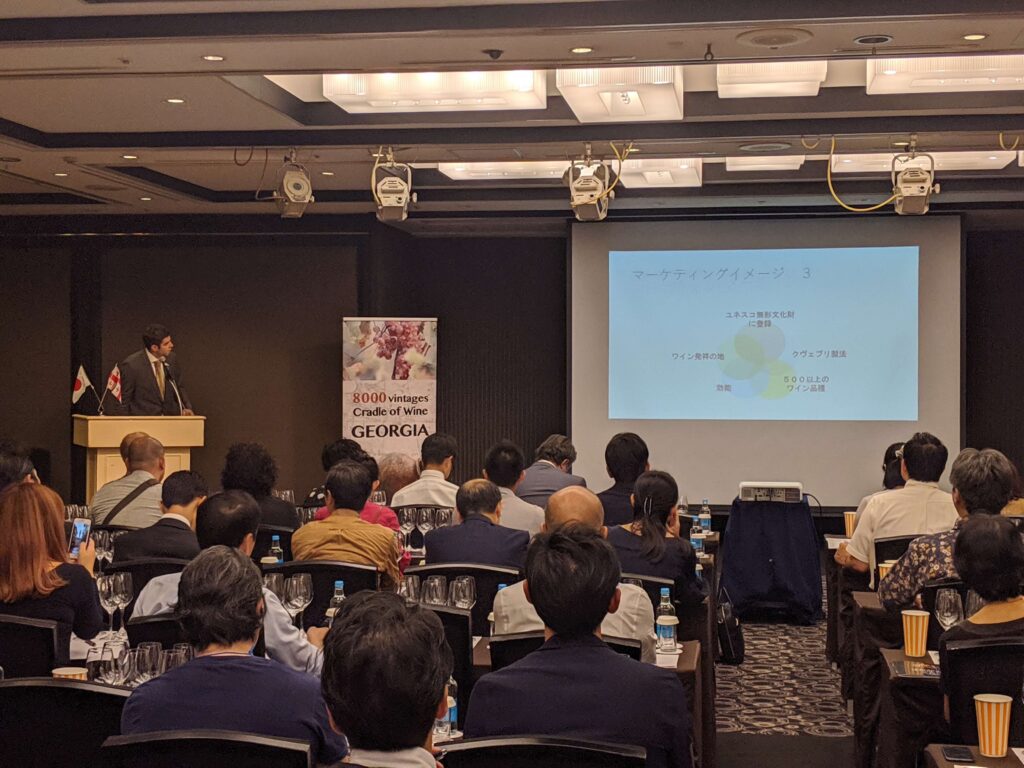
History is particularly appreciated in Japan. Therefore, highlighting important facts such as Georgian wine’s 8000-year-old history, 500 endemic varieties, and the uniquely Georgian culture of Supra and Tamada, is particularly important.
Annual alcohol consumption in Japan is only three litres per person. You may think that it is quite a low number; however, its population of 36 million, makes Japan a leading country by wine consumption.
Q: We would also like to hear about your Tamada Club initiative in Japan.
A: The Supra and Tamada culture we have in Georgia has no analogues in the world. That is why it is very important for me to share this culture with the Japanese. We created the Tamada Club precisely for this reason. We selected 500 Japanese Tamada based on the best toasts and awarded them with special Tamada certificates along with brochures about Georgian culture, history, and traditions. Their mission is to become the ambassadors of our culture, Supra and wine, to talk about Georgian culture with their friends and make toasts. All of this is done to enhance the friendship of two nations with great traditions, Georgia and Japan.
We organize online Supra through our club. Each Supra has a specific theme: Georgian cuisine, Georgian cinema, ballet, etc. We discuss these topics, make toasts, all the while remembering to use our popular and traditional word, “Gaumarjos!” (I’d like the Japanese people to know this word). Mr. Kenichi Ohashi serves as an executive Tamada of our club.
I also want to mention that we launched Tamada club’s website, with detailed information on the structure of the club, its goals, membership details, etc. We also publish information about the upcoming events of the club.
We would be glad to have Georgian winemakers, sommeliers, and enthusiasts of Georgian wine and cuisine in the club. It is a great platform that helps enhance cultural and business relations between the two countries. We are ready to consider anyone’s application for membership upon the submission of a cover letter.
Japanese consumers are more focused on our amber wine, which introduced Georgian wine to Japan and became our flagship. However, in addition to amber wine, our goal is to introduce our white and red wines and let the Japanese fall in love with them.
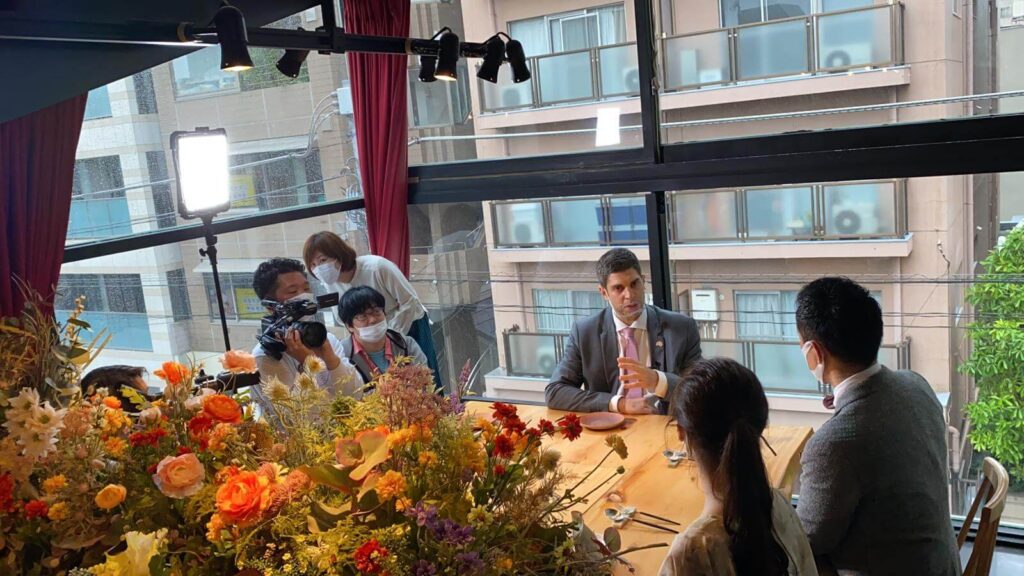
Q: Sparkling wine has become especially popular in Japan over the last few years, which makes up the majority of alcohol imports from France. Do Japanese consumers know about Georgian sparkling wine?
The good news is that “Tsinandali Estate,” as well as “Jujuna” sparkling wines, will soon be imported to Japan. Ms. Emi Kakinuma already sells Gvanta Abuladze’s PetNats on her online store (winemi.shop), and they are quite popular. We can see a positive trend here, which means we will be seeing more sparkling wines from various wineries and wine cellars.
The most frequent question that we receive in the embassy is: where can consumers buy Georgian wines? This directly indicates that awareness is growing. Consequently, we are working hard to make Georgian wine more accessible and include it in restaurants and various chain stores. We also want to increase online sales. We have a good practice of cooperation with Ms. Emi Kakinuma, who created an online store (winemi.shop) with the help of our consultations. Her store only sells Georgian wine, and successfully, I might add. Some of the wines represented at the store are “Archilis Wine,” “Anapea,” PetNats from “Gvantsa Abuladze,” “Tevza,” “Rokhi” etc.
We recommend focusing more on online sales, especially considering the pandemic and an increasing tendency to consume alcohol at home. We want to intensify our work and negotiations with importers in this regard.
Q: We must talk about Georgian cuisine, which you are actively promoting. As a result of the cooperation between Chikyu no Arukikata, the leading publishing house of the Japanese tourism industry, and the embassy, an additional chapter about Georgia was included in the 2021 World Cuisine Guide published by Chikyu no Arukikata, which extensively presents our country’s cuisine. There are also Khachapuri and Shkmeruli campaigns, and the inclusion of the latter in the menu of Japanese schools.
A: Indeed, our Shkmeruli became very popular in Japan, and local restaurants already offer it (including one of the largest restaurant chains, with 1000 branches). Furthermore, Shkmeruli instant packages are produced by up to ten different companies and can be purchased in up to 50,000 stores in the country. I can safely say that Shkmeruli is a real hit in Japan! Much like Khachapuri, which the locals also love.
Despite all this, establishing yourself in Japan is not an easy task. For example, I read in your magazine that there are several Georgian restaurants in London, unlike Japan where the first one – ”Soil” – opened just this year. Its menu is predominantly made of Georgian dishes. Hopefully, we will see more Georgian restaurants open in Japan.
I would like to focus on one crucial challenge that the world, including Japan, faces: environmental protection issues and ways to overcome them. When talking to importers about Georgian wine, we are often asked: what do Georgian winemakers do to protect the environment?
This is where our strongest message comes in: Georgian winemakers still make wine the same way they did 1000, 3000, and 8000 years ago – they do not use electricity because qvevri does not need it. Qvevri wine-making is safe for the environment, making qvevri wine the most eco-friendly beverage! It is the greatest example of social responsibility. And people will start talking about it! Until then, we must all work together to raise awareness in this area and create a success story.

